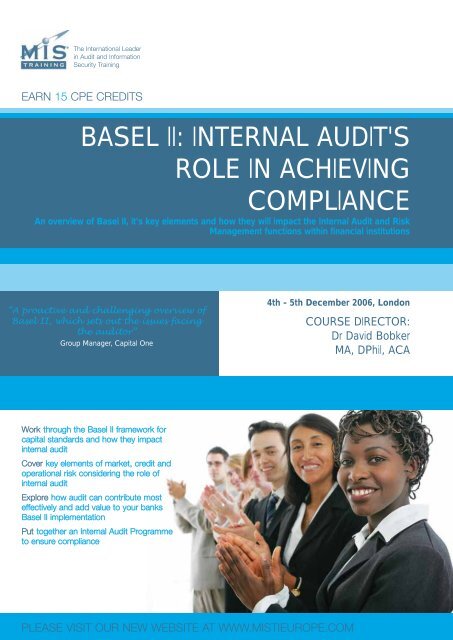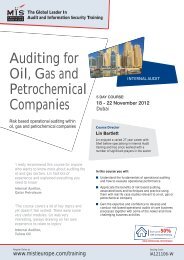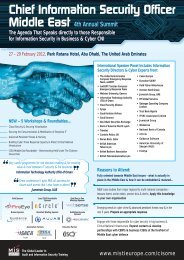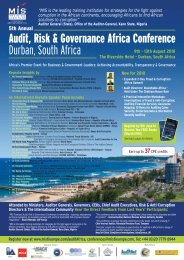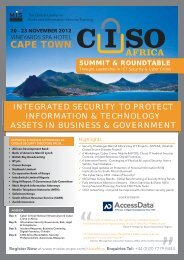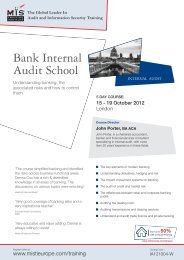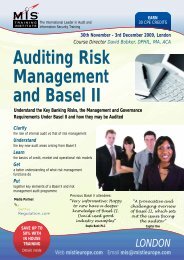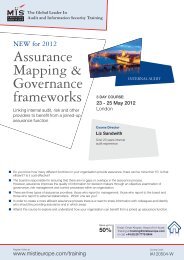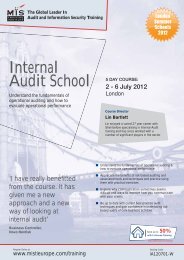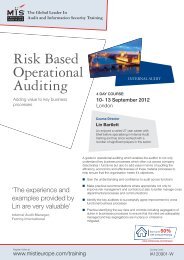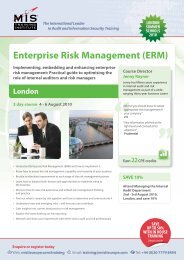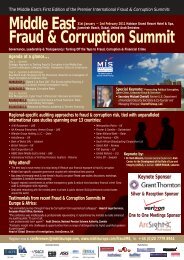BASEL II: INTERNAL AUDIT'S ROLE IN ACHIEVING ... - MIS Training
BASEL II: INTERNAL AUDIT'S ROLE IN ACHIEVING ... - MIS Training
BASEL II: INTERNAL AUDIT'S ROLE IN ACHIEVING ... - MIS Training
Create successful ePaper yourself
Turn your PDF publications into a flip-book with our unique Google optimized e-Paper software.
The International Leader<br />
in Audit and Information<br />
Security <strong>Training</strong><br />
EARN 15 CPE CREDITS<br />
<strong>BASEL</strong> <strong>II</strong>: <strong><strong>IN</strong>TERNAL</strong> <strong>AUDIT'S</strong><br />
<strong>ROLE</strong> <strong>IN</strong> ACHIEV<strong>IN</strong>G<br />
COMPLIANCE<br />
An overview of Basel <strong>II</strong>, it's key elements and how they will impact the Internal Audit and Risk<br />
Management functions within financial institutions<br />
“A proactive and challenging overview of<br />
Basel <strong>II</strong>, which sets out the issues facing<br />
the auditor”<br />
Group Manager, Capital One<br />
4th - 5th December 2006, London<br />
COURSE DIRECTOR:<br />
Dr David Bobker<br />
MA, DPhil, ACA<br />
Work through the Basel <strong>II</strong> framework for<br />
capital standards and how they impact<br />
internal audit<br />
Cover key elements of market, credit and<br />
operational risk considering the role of<br />
internal audit<br />
Explore how audit can contribute most<br />
effectively and add value to your banks<br />
Basel <strong>II</strong> implementation<br />
Put together an Internal Audit Programme<br />
to ensure compliance<br />
PLEASE VISIT OUR NEW WEBSITE AT WWW.<strong>MIS</strong>TIEUROPE.COM
SEM<strong>IN</strong>AR<br />
FOCUS AND FEATURES<br />
Basel <strong>II</strong>: Internal Audit’s<br />
Role in Achieving<br />
Compliance<br />
6th - 8th December 2006<br />
London<br />
It is estimated that banks worldwide<br />
are going to spend around 50 billion<br />
dollars implementing Basel <strong>II</strong>, mainly<br />
by introducing huge new systems,<br />
new infrastructure and armies of new<br />
risk managers to help monitor and<br />
manage risk. Since the more<br />
definitive division of active risk<br />
management has come from internal<br />
audit over recent years, it is important<br />
that internal auditors are clear about<br />
the critical role they need to play in all<br />
of the current frenetic activity and are<br />
able to communicate this effectively<br />
to the rest of the bank.<br />
This 2-day course works through the<br />
basic framework of the new Capital<br />
Accord from the point of view of a<br />
bank internal auditor facing the Basel<br />
challenge. Each of the key elements<br />
of market, credit and operational risk<br />
is examined and the internal auditor's<br />
role is considered. The course<br />
concludes with a review of the Basel<br />
approach to internal audit and the<br />
corporate governance of banks to<br />
help the participants clarify in their<br />
own minds how to contribute most<br />
effectively to the success of their<br />
institutions.<br />
Prerequisite<br />
Fundamentals of Internal Auditing<br />
Learning Level<br />
Basic<br />
Fee<br />
GBP £1,095<br />
Earn 15 CPE’s<br />
Who Should Attend<br />
Internal, IT and External Auditors and<br />
Risk Managers from financial<br />
institutions<br />
DAY ONE<br />
Overview of the Basel Capital<br />
Accord<br />
■ The three pillars<br />
■ The capital calculation<br />
■ Market, credit and operational<br />
risk<br />
The Basel Principles of Internal<br />
Audit<br />
■ The 20 Basel Principles<br />
■ Internal audit in practice<br />
■ Internal audit and corporate<br />
governance<br />
■ Relations with the external<br />
auditor and the regulator<br />
■ Relations with risk managers and<br />
the compliance officer<br />
■ Competence to audit Basel 2<br />
■ Dilemmas and possible solutions<br />
Key Basel Governance Principles<br />
■ Responsibilities of Board<br />
■ Key Committees – Audit<br />
Committee, Risk Committee<br />
■ Independent risk management<br />
function<br />
■ Key qualitative standards for risk<br />
management<br />
■ FSA requirements – capital<br />
assessment system<br />
■ The other Basel papers:<br />
Operational Risk, Interest Rate<br />
Risk, Credit Risk, Market Risk<br />
Operational Risk<br />
■ The three approaches: BIA,TSA,<br />
AMA<br />
■ Business line classification<br />
■ Qualitative requirements for TSA<br />
■ Introduction to AMA<br />
■ The role of internal audit<br />
The Advanced Measurement<br />
Approach<br />
■ Fundamentals of quantitative risk<br />
measurement<br />
■ The four elements<br />
■ Business environment<br />
■ Internal and external data<br />
■ Scenario analysis<br />
■ The AMA soundness standard<br />
■ Problems and issues with the<br />
AMA<br />
■ Internal audit and the use of<br />
specialists<br />
Event Databases<br />
■ Use and misuse of event data<br />
■ Key requirements<br />
■ The main data fields<br />
■ The importance of establishing<br />
causality<br />
DAY TWO<br />
Credit Risk<br />
■ Understanding credit risk<br />
■ Assessment of individual credits<br />
■ Off balance sheet items<br />
■ Loan portfolio analysis<br />
■ The standardized capital<br />
calculation<br />
■ The Internal Ratings Basis<br />
■ Pre-conditions for use of IRB<br />
■ Credit risk governance<br />
■ Internal audit<br />
“High level<br />
introduction to<br />
Basel <strong>II</strong> and<br />
overview of Risk<br />
Management”<br />
Internal Auditor, Investec Ltd<br />
Market Risk<br />
■ Types of instruments<br />
■ Types of market risk<br />
■ Treasury/back book vs the<br />
trading book<br />
■ Interest rate risk management<br />
■ Value At Risk and capital<br />
calculations<br />
■ Market risk governance – the<br />
Middle Office<br />
■ Internal audit’s role
COURSE<br />
DIRECTOR<br />
Economic Capital and Regulatory<br />
Capital<br />
■ Risk Adjusted Performance<br />
Measures<br />
■ Economic capital and risk<br />
appetite – subjective aspects<br />
■ RAROC, RARORAC<br />
■ The problems of capital allocation<br />
■ The bank’s risk policies<br />
Pillar 2 Supervisory Review and<br />
Corporate Governance<br />
■ The four Basel principles of<br />
supervisory review<br />
■ Assessment of capital adequacy<br />
■ Supervisory review<br />
■ Additional capital requirements<br />
■ Supervisory intervention<br />
■ The bank’s response<br />
■ Internal capital assessment<br />
processes<br />
■ Internal audit review of capital<br />
assessment<br />
■ Benchmarking implementation<br />
■ Minimum qualitative standards<br />
■ Governance structures<br />
■ Expert review of advanced<br />
approach models (AMA, IRB,<br />
Market Risk)<br />
■ FSA’s approach to internal audit<br />
involvement<br />
Dr David Bobker, MA, DPhil, ACA<br />
After completing a DPhil in mathematics at<br />
Oxford University, David worked as a manager<br />
in a small, diverse, banking and property<br />
company in London. He left the company to<br />
train as a chartered accountant with Peat<br />
Marwick Mitchell (KPMG) specialising in the<br />
insurance industry and statistical auditing. He<br />
later moved to Touche Ross, where he provided<br />
regulatory compliance advice mainly to<br />
wholesale banks and broker dealers.<br />
In 1989 David was seconded to the Building<br />
Societies Commission as a Supervisor. He had<br />
policy responsibility for capital adequacy which<br />
included UK implementation of European capital<br />
adequacy rules and new rules on capital<br />
instruments for building societies. After leaving<br />
the Commission he moved into the internal<br />
audit profession at Alliance & Leicester where<br />
he was Head of Group Audit and Group<br />
Compliance Officer for 7 years. In order to<br />
provide a more soundly based internal audit<br />
service he developed specialist audit software<br />
to ensure fully concise, logical analysis<br />
underpinned all internal audits.<br />
In 1998 he moved to Norwich Union as Head of<br />
Group Internal Audit. His responsibilities during<br />
those years included pioneering work on<br />
implementing corporate governance<br />
arrangements and “enterprise risk<br />
management”, what became later Turnbull<br />
compliant systems. Involving systems of risk<br />
identification and assessment, effectiveness of<br />
controls and compliance processes together<br />
with appropriate corporate reporting systems for<br />
the board and audit committee.<br />
David set up Real Assurance in 2001 helping<br />
clients move towards best practice in quantified<br />
risk management systems (especially for<br />
banking industry implementing Basel 2),<br />
corporate governance and compliance.<br />
Putting Together an Internal Audit<br />
Programme<br />
■ Internal Audit’s overall role<br />
■ Risk based analysis of Basel 2<br />
compliance<br />
■ Internal audit policy
REGISTRATION FORM<br />
<strong>IN</strong>-HOUSE<br />
TRA<strong>IN</strong><strong>IN</strong>G<br />
Save up to 50% on training<br />
Tailored <strong>Training</strong> for your team and Save up<br />
to 50% If you have to comply with<br />
Sarbanes-Oxley, just installed a new ERP<br />
system, recruited new staff - or maybe you<br />
are keen to secure your network, take<br />
preventative measures to counteract fraud<br />
or comply with the latest legislation. Either<br />
way if you have 5 or more people who<br />
require training on the same topic, <strong>MIS</strong> can<br />
tailor training courses to meet your exact<br />
We charge per day and NOT per<br />
participant so the cost remains the same<br />
regardless of how many people you have in<br />
your team.<br />
Basel <strong>II</strong>: Internal Audit’s<br />
Role in Achieving<br />
Compliance<br />
(please photocopy form for additional delegates)<br />
4th - 5th December 2006, London<br />
(MT2015)<br />
GBP £1,095 £<br />
+ VAT @ 17.5% £<br />
Grand Total £<br />
*Discounts: Government, 10% off regular<br />
fees. Please call to enquire about corporate<br />
discounts. Discounts can not be used in<br />
conjunction with each other.<br />
Fees must be paid in advance of the event.<br />
Customer Information<br />
Title First name Surname<br />
Title/Position<br />
Organisation<br />
E-Mail Address (Required)<br />
Address<br />
Country<br />
Postcode<br />
Telephone<br />
Fax<br />
The information you provide will be safeguarded by the Euromoney Institutional Investor PLC group whose<br />
subsidiaries may use it to keep you informed of relevant products and services. We occasionally allow<br />
reputable companies outside the Euromoney Institutional Investor PLC group to contact you with details of<br />
products that may be of interest to you. As an international group we may transfer your data on a global<br />
basis for the purposes indicated above. If you object to contact by telephone , fax , or email please<br />
tick the relevant box. If you do not want us to share your information with other reputable companies<br />
please tick this box .<br />
Payment Information - You can now pay on-line at www.mistieurope.com<br />
Cheque enclosed (payable to <strong>MIS</strong> <strong>Training</strong>) Please invoice my company PO#<br />
Please debit my credit card AMEX VISA MasterCard<br />
Card Number<br />
Expiry<br />
Cardholders name<br />
Verification Code<br />
Please include billing address if different from address given<br />
Please note that in completing this booking you undertake to adhere to the cancellation<br />
and payment terms listed below<br />
Signature<br />
5 easy ways to register<br />
Tel: +44 (0)20 7779 8944<br />
Fax completed form to:<br />
+44 (0)20 7779 8293<br />
Email: mis@mistiemea.com<br />
Web: www.mistieurope.com<br />
Post completed form to:<br />
Lisa Davies,<br />
<strong>MIS</strong> <strong>Training</strong>, Nestor House,<br />
Playhouse Yard,<br />
London<br />
EC4V 5EX UK<br />
Date<br />
WEB<br />
With In-House <strong>Training</strong> You<br />
Will:<br />
Save money over public seminar fees in<br />
addition to savings on travel and<br />
accommodation costs.<br />
Save time on travel as the instructor will<br />
travel to you. Furthermore, the training can<br />
be held at the most convenient time for<br />
you.<br />
Ensure the relevance of the seminar for<br />
your organisation and industry. You may<br />
wish to tailor the structure and<br />
methodology of your seminar or customise<br />
the seminar to meet the expertise levels of<br />
your attending employees.<br />
Please send me information on:<br />
In House <strong>Training</strong><br />
Data Mining for Auditors, 30th<br />
November - 1st December 2006,<br />
London<br />
Auditing the Treasury Function 6th<br />
- 8th December 2006, London<br />
Registration Information<br />
(fees must be paid in advance of the event)<br />
Accommodation: <strong>MIS</strong> <strong>Training</strong> has negotiated<br />
special accommodation rates at hotels in<br />
central London. For further information please<br />
call IBR on +44 (0) 1332 285521 or fax 0845<br />
3304982 (UK only) or +44 (0) 1332 287613<br />
(Outside UK) or go to www.ibr.co.uk/mis.<br />
Cancellation Policy: Should a delegate be unable<br />
to attend, a substitute may attend in his or her<br />
place. Cancellations received within 21 working<br />
days of the event are liable for the full seminar fee.<br />
If full payment has been received you are eligible<br />
for a 75% reduction on the next run of the<br />
seminar. This discount will be valid for one year<br />
only. <strong>MIS</strong> reserves the right to change or cancel<br />
programmes due to unforeseen circumstances.<br />
VAT: All delegates attending are liable to pay VAT.<br />
After the event organisations registered for VAT in<br />
the UK may reclaim the tax. Delegates from<br />
outside the UK but within the European<br />
Community may also be able to reclaim the VAT.<br />
Organisations outside the UK should check with<br />
their excise authority as to which domestic fiscal<br />
regulations apply. High Yield/No-Risk<br />
Guarantee: Attend these workshops and receive<br />
tools and techniques that will help you do your job<br />
better. If you do not, simply tell us why on your<br />
company letterhead and we will give you a full<br />
credit toward another programme.<br />
Approving Manager<br />
Position


